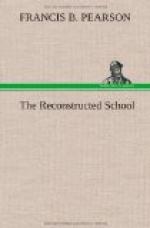This arithmetic habit had its origin, doubtless, in the traditional concept of knowledge as power. An adage is not easily controverted or eradicated. The copy-books of the fathers proclaimed boldly that knowledge is power, and the children accepted the dictum as inviolable. If it were true that knowledge is power, the procedure of the schools and the course of conduct of the teachers during all these years would have ample justification. The entire process would seem simplicity itself. So soon as we acquire knowledge we should have power—and power is altogether desirable. The trouble is that we have been confusing knowledge and wisdom in the face of the poet’s declaration that “Knowledge and wisdom, far from being one, have ofttimes no connection.” Our experience should have taught us that many people who have much knowledge are relatively impotent for the reason that they have not learned how to use their knowledge in the way of generating power. Gasoline is an inert substance, but, under well-understood conditions, it affords power. Water is not power, but man has learned how to use it in generating power. Knowledge is convenient and serviceable, but its greatest utility lies in the fact that it can be employed in producing power.
We are prone to take our judgments ready-made and have been relying upon the copy-books of the fathers rather than our own reasoning powers. If we had only learned in childhood the distinction between knowledge and wisdom; if we had learned that knowledge is not power but merely potential; and if we had learned that knowledge is but the means to an end and not the end itself, we should have been spared many a delusion and our educational sky would not now be so overcast with clouds. We have been proceeding upon the agreeable assumption that arithmetic, geography, and history are the goals of every school endeavor, the Ultima Thule of every educational quest. The child studies arithmetic, is subjected to an examination that may represent the bent or caprice of the teacher, manages to struggle through seventy per cent of the answers, is promoted to the next higher grade, and, thereupon, starts on his journey around another circle. And we call this education. These processes constitute the mechanics of education, but, in and of themselves, they are not education. One of the big problems of the school today is to emancipate both teachers and pupils from the erroneous notion that they are.
The child does not go to school to learn arithmetic and spelling and grammar. The goal to be attained is far higher and better than either of these or all combined. The study of arithmetic may prove a highly profitable means, never the end to be gained. This statement will be boldly challenged by the traditional teacher, but it is so strongly intrenched in logic and sound pedagogy that it is impregnable. The goal might, possibly, be reached without the aid of arithmetic, but, if a knowledge of this subject will




